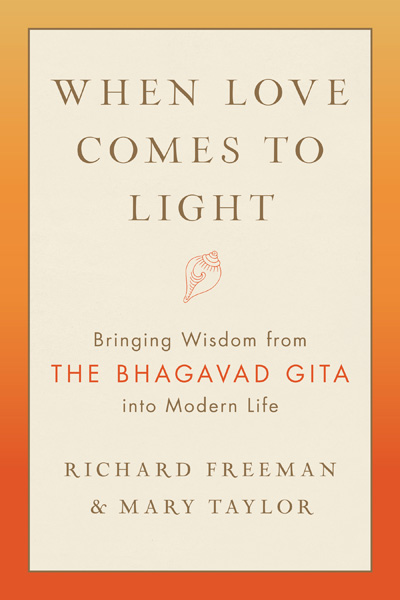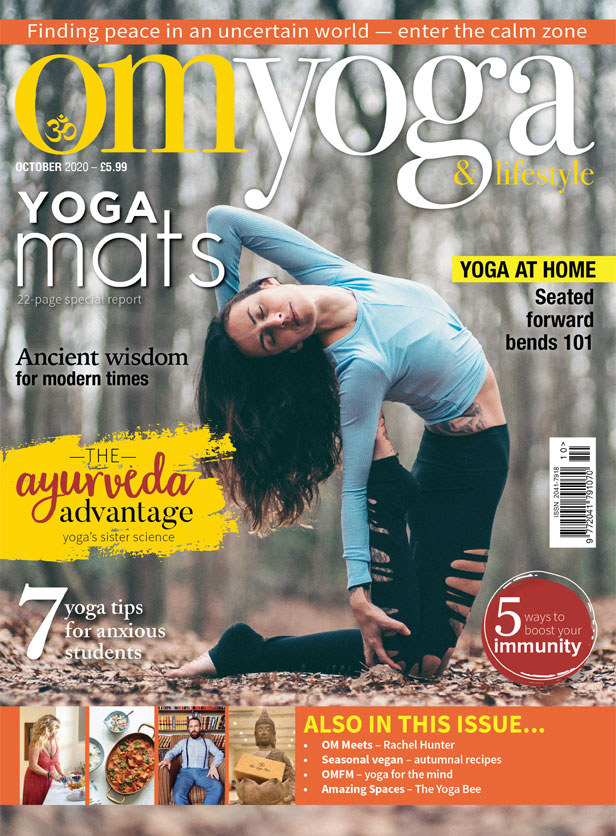
Ancient wisdom for modern times
“Beneath personality and the roles you take on in the world is the essence of who you are as a human being; someone with endless capacity to love and the desire to be happy". Drawing on lessons from the Bhagavad Gita, a classic yogic text, to navigate the challenges of today. By Richard Freeman and Mary Taylor
An elephant with long pointed ears and half-closed eyes gazes down calmly at the chaos below. Then we look again. Winds have nudged the elephant away and colours shifted from greys to shades of orange in the morning light. Dramatic change right before our eyes is reassuring when the sun dutifully appears in the sky and sounds take on familiar patterns signaling another day. But anxiety, confusion and a sense of overwhelming crisis can predominate when things change abruptly or in ways that challenge our expectations, beliefs or understanding of the world.
And that’s what’s happening today. We’ve been shaken to the core by unexpected change. In a flash the pandemic, lockdowns, economic uncertainty and the Black Lives Matter movement flipped things upside down forcing us to step outside habitual ways of thinking and behaving. Without lockdowns, which left us vulnerable and raw, we might not have been impacted so deeply by images of George Floyd crying out for his mother, just as we would have in his situation. We might not have felt the profound suffering of dying alone from the virus, or recognised as noble the everyday acts of service from front-line workers.
From complex relationships, tragic events and ethical dilemmas, when faced with crisis the conflict of not knowing what to do, yet knowing we must do something, predominates. Today, the best way to address confusion and other responses sparked by the current crisis is to find enough physical and mental stability to stay tuned in to what’s going on right here, right now and to respond in the best way possible. But how on earth do you do that?
Not knowing the best course of action in times of crisis is an age-old problem and is the subject of the Bhagavad Gita, a classic yogic text. In the story a princely warrior, Arjuna, finds himself on a battlefield between two armies vying for power. It is the field of real life where responsibilities and actions meet, sometimes making the next move crystal clear, and other times creating utter confusion. Arjuna has been trained to fight and help rule the kingdom, yet as an intelligent, kind soul, he is overwhelmed by the reality of the situation — with friends, family and teachers on both sides his gut knows that a bloodbath lies ahead. What good will come from winning the war, knowing many of those he’d wish to share the victory with will die? Not knowing what to do, he collapses in dismay. As the story unfolds, Arjuna discovers a path through the chaos. The lessons he learns apply directly to what so many of us are experiencing today and may shed light on beginning steps toward feeling better and making a difference in these turbulent times.
Watching Change
Everything we encounter from our breath to the sunrise or heart-wrenching emotions changes over time. When you have a headache if you observe closely you’ll notice a wave pattern of sensation; intensity of pain, subsiding to neutral or no pain and then another surge of intensity. Knowing things will change can be helpful in times of difficulty because change reveals there is more going on than we think; things could get worse or may improve. But how do you take action that will facilitate beneficial change?
Getting Grounded
First you need to embody the knowledge that things change. If you feel anxious or overwhelmed, pause and consciously follow the sensations of your breath. Inhaling your ribs expand, your heart floats. A gap. Exhaling your sitting bones are heavy, you’re connected to earth. Another gap. You can viscerally feel the pervasive wave pattern of change. After observing a few breaths, take another look at things.
Your view of it may have changed. Even when things seem terrible, perhaps you’ll notice that sometimes they seem more terrible than at other times. Following your breath allows you to understand on an intuitive level the nature of change. Training your mind to focus on physical sensations rather than being carried away by thoughts and emotions automatically facilitates mental and emotional stability that help us deal with change and crises.
Knowing Who You Are
You can also look at how you identify yourself in light of change. We’re all unique individuals with distinctive talents, dreams, interests and circumstances. Yet we too are always changing. Who we are now is different from who we were as a child, or even last week. Our intentions and dreams may have continuity, but if we become trapped in the idea, the storyline, of ‘me’ — a parent, teacher, lover and so on, we take actions based on a contrived story rather than on the moment to moment unfolding of life around us. Beneath personality and the roles you take on in the world is the essence of who you are as a human being; someone with endless capacity to love and the desire to be happy. Your roles provide scaffolding so you can operate in the world. But to be part of the world, to act responsibly and contribute fully, you need to feel connected through the heart to others and to the world as a whole. From there, knowing what the best action is becomes possible.
Knowing What to Do
In complex situations, engaging is vital even if you choose to do nothing. It’s impossible to know with 100% certainty what to do, however the more stable you feel in mind, body and heart, and the more connected you feel to the essence of who you are, the easier it is to see clearly and assess what actions to take. The tricky part is that directed action requires you have a goal, but if you hold onto the desired outcome too fiercely or if the motives driving your actions are self-serving, you’ve lost connection to the deeper context of your situation and to others, you don’t hear feedback and your actions are likely to be harmful rather than beneficial. In a pinch, if you don’t know what to do, remember we’re in this together, we’re all connected, and that action steeped in love and communication will create a more compassionate world.

Richard Freeman and Mary Taylor are the authors of the new book, When Love Comes to Light: Bringing Wisdom from the Bhagavad Gita into Modern Life, published in September by Shambhala. Visit: richardfreemanyoga.com


